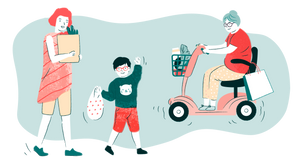
What is a stroke?
A stroke is a "brain attack". It can happen to anyone at any time.
It happens when blood flow to an area of brain is cut off. When this occurs, brain cells are deprived of oxygen and begin to die. When brain cells die during a stroke, abilities controlled by that area of the brain such as memory and muscle control are lost.
About 85% of strokes are caused by an artery blockage (ischaemic stroke) and about 15% are caused by a bleed (haemorrhage) in or around the brain.
Signs of a stroke
A stroke has an immediate effect on how both the body and mind work. Typical symptoms include:
- numbness, weakness or paralysis on one side of your body
- slurred speech, or difficulty finding words or understanding speech
- sudden blurred vision or loss of sight
- confusion or unsteadiness, or
- a sudden, severe headache.
Who can help you recovering from a stroke?
- Nurses, clinical nurse specialists and healthcare assistants. These are your main carers in hospital.
Good nursing care at this early stage helps avoid complications after your stroke. The care during the first 2-4 weeks after a stroke is vital as the stroke might re-occur. (20-40% of patients may experience a recurrent stroke within 5 years of the first stroke and recurrent strokes have a higher rate of disability or death.) For example, if you have paralysis in your arm or leg, a nurse can make sure you are positioned and supported correctly to prevent further damage or pain. If you cannot move about in bed yourself, you may need a special mattress or to be moved regularly to avoid pressure sores and blood clots forming.
- Physiotherapist
If you have balance problems, paralysis or muscle weakness, a physiotherapist can: help you to sit, stand or lie down, and develop exercises to help you move more easily and stop any weak limb
- Speech and language therapist
If you have difficulty with swallowing or communicating, a speech and language therapist can: help with swallowing problems, suggest ways to help you communicate using exercises, speech, reading and writing, and explain to family and friends how they can help you to communicate.
- Dietitian
A dietitian can recommend a healthy and nutritious diet if you have swallowing problems, are being fed using a tube, are underweight, have lost your appetite or have diabetes.
- Occupational therapist
If you are confused, lack some co-ordination, are not able to concentrate or cannot see properly, an occupational therapist can: teach you how to get dressed, use the toilet and wash yourself, and give you advice on equipment, including a wheelchair or adaptations. They may visit your home before you leave hospital.
- Clinical psychologist
A clinical psychologist can help you deal with emotional problems after a stroke. These may include anxiety, depression and mood swings. They can also help if you have problems concentrating, planning or remembering things.



Leave a comment